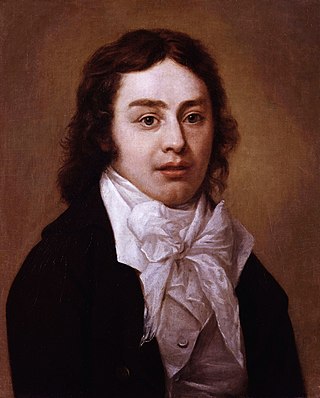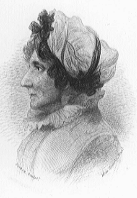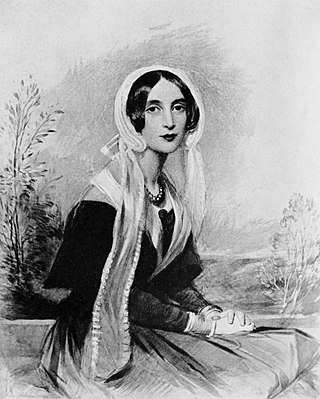Related Research Articles

Romanticism was an artistic, literary, musical and intellectual movement that originated in Europe towards the end of the 18th century; in most areas it was at its peak in the approximate period from 1800 to 1850. Romanticism was characterized by its emphasis on emotion and individualism, clandestine literature, paganism, idealization of nature, suspicion of science and industrialization, as well as glorification of the past with a strong preference for the medieval rather than the classical. It was partly a reaction to the Industrial Revolution, the social and political norms of the Age of Enlightenment, but also the scientific rationalization of nature. It was embodied most strongly in the visual arts, music and literature; it had a major impact on historiography, education, chess, social sciences and the natural sciences. It had a significant and complex effect on politics, with romantic thinkers influencing conservatism, liberalism, radicalism and nationalism.

Samuel Taylor Coleridge was an English poet, literary critic, philosopher, and theologian who, with his friend William Wordsworth, was a founder of the Romantic Movement in England and a member of the Lake Poets. He also shared volumes and collaborated with Charles Lamb, Robert Southey, and Charles Lloyd. He wrote the poems The Rime of the Ancient Mariner and Kubla Khan, as well as the major prose work Biographia Literaria. His critical work, especially on William Shakespeare, was highly influential, and he helped introduce German idealist philosophy to English-speaking cultures. Coleridge coined many familiar words and phrases, including "suspension of disbelief". He had a major influence on Ralph Waldo Emerson and American transcendentalism.

Maria Edgeworth was a prolific Anglo-Irish novelist of adults' and children's literature. She was one of the first realist writers in children's literature and was a significant figure in the evolution of the novel in Europe. She held views on estate management, politics and education, and corresponded with some of the leading literary and economic writers, including Sir Walter Scott and David Ricardo.

Castle Rackrent is a short novel by Maria Edgeworth published in 1800. Unlike many of her other novels, which were heavily "edited" by her father, Richard Lovell Edgeworth, before their publication, the published version is close to her original intention.

Anna Laetitia Barbauld was a prominent English poet, essayist, literary critic, editor, and author of children's literature. A "woman of letters" who published in multiple genres, Barbauld had a successful writing career that spanned more than half a century.
This article contains information about the literary events and publications of 1798.

Sara Coleridge was an English author and translator. She was the third child out of four and the only daughter of the poet Samuel Taylor Coleridge and his wife Sara Fricker. She gained further popularity with instructive verses for children.
The "Graveyard Poets", also termed "Churchyard Poets", were a number of pre-Romantic poets of the 18th century characterised by their gloomy meditations on mortality, "skulls and coffins, epitaphs and worms" elicited by the presence of the graveyard. Moving beyond the elegy lamenting a single death, their purpose was rarely sensationalist. As the century progressed, "graveyard" poetry increasingly expressed a feeling for the "sublime" and uncanny, and an antiquarian interest in ancient English poetic forms and folk poetry. The "graveyard poets" are often recognized as precursors of the Gothic literary genre, as well as the Romantic movement.

Romantic poetry is the poetry of the Romantic era, an artistic, literary, musical and intellectual movement that originated in Europe towards the end of the 18th century. It involved a reaction against prevailing Enlightenment ideas of the 18th century, and lasted approximately from 1800 to 1850. Romantic poets rebelled against the style of poetry from the eighteenth century which were based around epics, odes, satires, elegies, epistles and songs.
Western literature, also known as European literature, is the literature written in the context of Western culture in the languages of Europe, as well as several geographically or historically related languages such as Basque and Hungarian, and is shaped by the periods in which they were conceived, with each period containing prominent western authors, poets, and pieces of literature.
Nationality words link to articles with information on the nation's poetry or literature.
Nationality words link to articles with information on the nation's poetry or literature.

"Ode: Intimations of Immortality from Recollections of Early Childhood" is a poem by William Wordsworth, completed in 1804 and published in Poems, in Two Volumes (1807). The poem was completed in two parts, with the first four stanzas written among a series of poems composed in 1802 about childhood. The first part of the poem was completed on 27 March 1802 and a copy was provided to Wordsworth's friend and fellow poet, Samuel Taylor Coleridge, who responded with his own poem, "Dejection: An Ode", in April. The fourth stanza of the ode ends with a question, and Wordsworth was finally able to answer it with seven additional stanzas completed in early 1804. It was first printed as "Ode" in 1807, and it was not until 1815 that it was edited and reworked to the version that is currently known, "Ode: Intimations of Immortality".
"To the River Otter" is a sonnet by Samuel Taylor Coleridge. Though its date of creation is uncertain, it was possibly composed in 1793. It deals with the image of the River Otter, near Coleridge's childhood home in Devon.

The conversation poems are a group of at least eight poems composed by Samuel Taylor Coleridge (1772–1834) between 1795 and 1807. Each details a particular life experience which led to the poet's examination of nature and the role of poetry. They describe virtuous conduct and man's obligation to God, nature and society, and ask as if there is a place for simple appreciation of nature without having to actively dedicate one's life to altruism.
Sonnets on Eminent Characters or Sonnets on Eminent Contemporaries is an 11-part sonnet series created by Samuel Taylor Coleridge and printed in the Morning Chronicle between 1 December 1794 and 31 January 1795. Although Coleridge promised to have at least 16 poems within the series, only one addition poem, "To Lord Stanhope", was published.
Romanticism originated in the second half of the 18th century at the same time as the French Revolution. Romanticism continued to grow in reaction to the effects of the social transformation caused by the Revolution. There are many signs of these effects of the French Revolution in various pieces of Romantic literature. By examining the influence of the French Revolution, one can determine that Romanticism arose as a reaction to the French Revolution. Instead of searching for rules governing nature and human beings, the romantics searched for a direct communication with nature and treated humans as unique individuals not subject to scientific rules.

Romanticism was an artistic, literary, and intellectual movement that originated in Europe toward the end of the 18th century. Scholars regard the publishing of William Wordsworth's and Samuel Coleridge's Lyrical Ballads in 1798 as probably the beginning of the movement, and the crowning of Queen Victoria in 1837 as its end. Romanticism arrived in other parts of the English-speaking world later; in the United States, it arrived around 1820.

Beachy Head is a long blank verse poem by the English Romantic poet and novelist Charlotte Turner Smith, published in 1807, the year after her death, as part of the volume Beachy Head and Other Poems. The poem imagines events at the coastal cliffs of Beachy Head from across England's history, to meditate on what Smith saw as the modern corruption caused by commerce and nationalism. It was her last poetic work, and has been described as her most poetically ambitious work. As a Romantic poem, it is notable for its naturalist rather than sublime presentation of the natural world.
Isabella Lickbarrow was an English poet from Kendal who is sometimes associated with the Lake Poets. She published two collections: Poetical Effusions (1814) and A Lament upon the Death of Her Royal Highness the Princess Charlotte; and Alfred, a Vision (1818). Her work covers a wide variety of subjects, but scholars have noted in particular her topographical poetry and political poetry about the Napoleonic Wars.
References
- 1 2 "Heidi Thomson – School of English, Film, Theatre, and Media Studies – Victoria University of Wellington". www.victoria.ac.nz.
- ↑ Saunders, Kate (2 April 2011). "Honour for Keats' friend". Stuff.
- ↑ "Romantic voyagers voyage the Romantics at literature conference". www.creativenz.govt.nz.
- ↑ GALLCHOIR, CLÍONA Ó (2006). "Review of Kaufman and Fauske, eds., An Uncomfortable Authority: Maria Edgeworth and her Contexts". Nineteenth-Century Literature. 61 (1): 99–103. doi:10.1525/ncl.2006.61.1.99. ISSN 0891-9356. JSTOR 10.1525/ncl.2006.61.1.99.
- ↑ Hay, Marnie (2006). "Review of An Uncomfortable Authority: Maria Edgeworth and Her Contexts". Eighteenth-Century Ireland / Iris an Dá Chultúr. 21: 158–160. ISSN 0790-7915. JSTOR 30071288.
- ↑ Landry, D. (May 2005). "An Uncomfortable authority: Maria Edgeworth and her contexts [review]". Choice. 42: 9. ProQuest 225785154.
- ↑ Rennie, Simon (11 October 2017). "Coleridge and the Romantic Newspaper: The "Morning Post" and the Road to "Dejection" by Heidi Thomson, and: Poets of the People's Journal: Newspaper Poetry in Victorian Scotland ed. by Kirstie Blair, and: The Life and Works of James Easson: The Dundee People's Poet ed. by Anthony Faulkes (review)". Victorian Periodicals Review. 50 (3): 662–666. doi:10.1353/vpr.2017.0045.
- ↑ Blank, G. Kim (2 January 2018). "Coleridge and the Romantic Newspaper: The "Morning Post" and the Road to "Dejection / A Modern Coleridge: Cultivation, Addiction, Habits". European Romantic Review. 29 (1): 102–110. doi:10.1080/10509585.2018.1417065. S2CID 149860785.